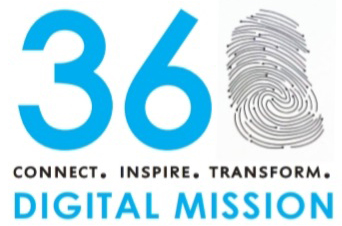NEW CO-WORKING SPACE IS LOOKING FOR THE NEXT FACEBOOK TO DISRUPT HOW WE DO MISSIONS
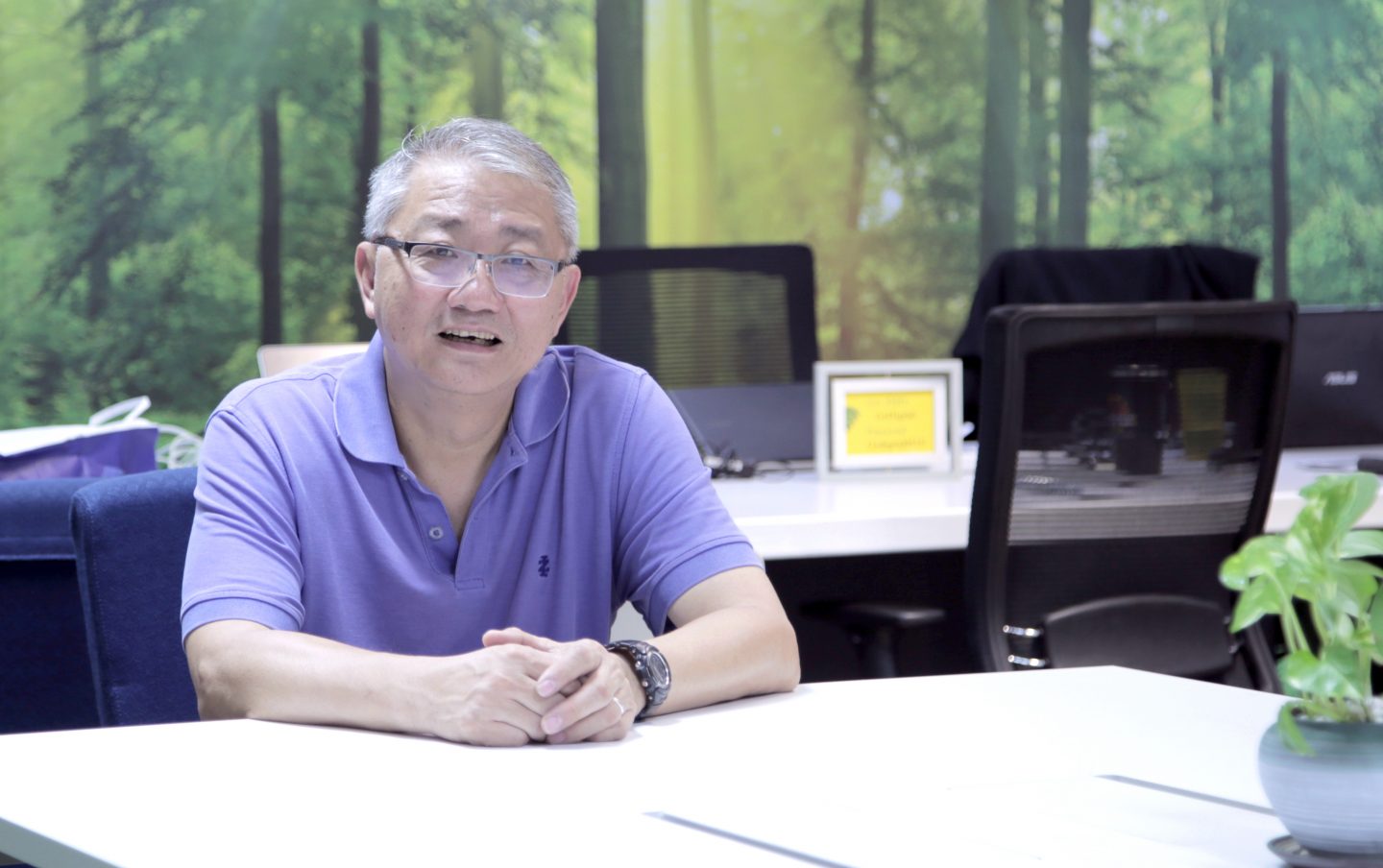
Lim Shu Chen, an IBM veteran of 30 years, runs the Digital Mission@360 hub, a co-working space for those who want to evangelise the unreached using digital means. All photos by Jane Lee unless otherwise stated.
A private venture fund launched in September 2020, this entity serves as a missional investment platform for the missional start-ups in the digital field. It connects missional investors with like-minded start-ups.
Yet most of that remains head knowledge; applying the principles is less straightforward.
Goh and the counsellor have asked the couple to include specific cases in the next session, so that the two professionals can give them some practical guidance on how to deal with them.
“This is the power of digital,” says Goh, 48, who works in a non-profit agency. “I can now share the skills that I learn from work with others who are far away over a ‘shortened’ distance.
“This is the power of digital: I can share my skills with others over a ‘shortened’ distance.”
“We’re also planning to go and do a face-to-face training with them, which can be recorded and distributed digitally to their volunteer counsellors around the country.”
These are the kinds of connections that the recently launched Digital Mission@360 Hub is aiming to broker and accelerate.
“Taking forever”
Housed at 360 Dunearn Road, the hub is a “co-labouring” space for those who want to evangelise the unreached using digital means.
“We want to create the right environment to bring the right digital people together and, through that, create startups that will make an impact,” says Lim Shu Chen, 61, who is in charge of the hub and chose the job title of “chief digital servant” for himself.
“We have a big problem – our traditional methods are taking forever to reach the more than 3 billion unreached people in the 10/40 window. And it’s also becoming increasingly dangerous and challenging to do missions there.”
The IBM veteran of 30 years pointed out that technology had always helped to accelerate the spreading of the Gospel – Paul and the disciples used Roman roads for travelling while the Reformation was largely due to the printed press and wide availability of the Bible – but the Church is still slow in using technology for missions.

Technology had always helped accelerate the spreading of the Gospel.
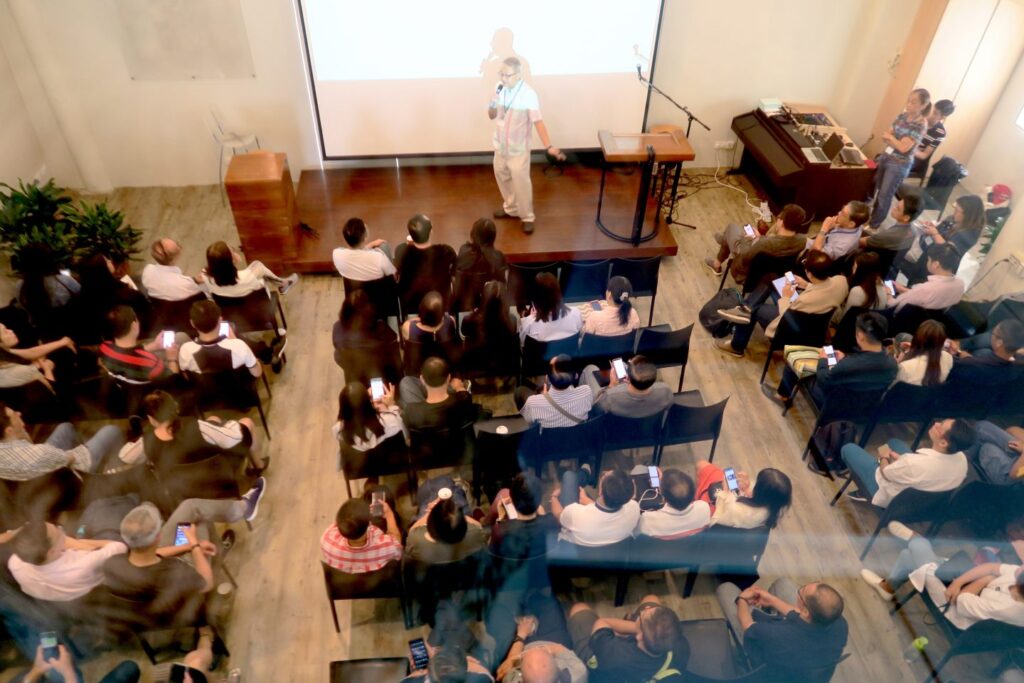
Almost 160 people attended the launch of the Digital Mission@360 hub. This picture was taken from the gallery on the 4th floor, which is now a brainstorming area. Photo courtesy of Digital Mission@360.
“We have BioTech, FinTech, GovTech. It’s time for MinTech, or Ministry Technology,” he says in earnest.
Not just a physical space
The premise was previously used by Gospel Light Christian Church, which also owns it, for its Sunday services before they moved to Punggol.
It has now been reconfigured and renovated into a co-working space that includes a hot-desking area, conference rooms, brainstorming areas, shower facilities, a 150-seat auditorium and a café that’s exclusive to those working at the hub.
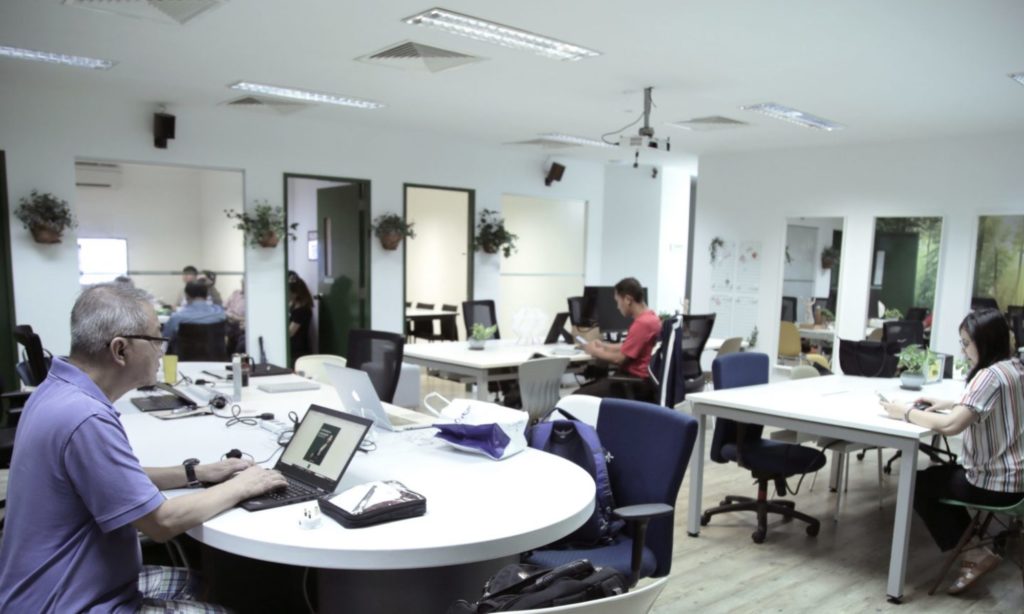
Almost 160 people attended the launch of the Digital Mission@360 hub. This picture was taken from the gallery on the 4th floor, which is now a brainstorming area. Photo courtesy of Digital Mission@360.
Unlike typical co-working spaces, there are no monthly fees. Startups, however, will be encouraged to give a donation to help cover operational costs.
Lim reckons that the hub can accommodate up to 50 startups. There are about 10 now, including Cru Digital Asia, Actsmarket and Indigitous.
“We’re not looking for quantity. We’re more interested in the content they bring and their willingness to share intellectual property,” he explains.
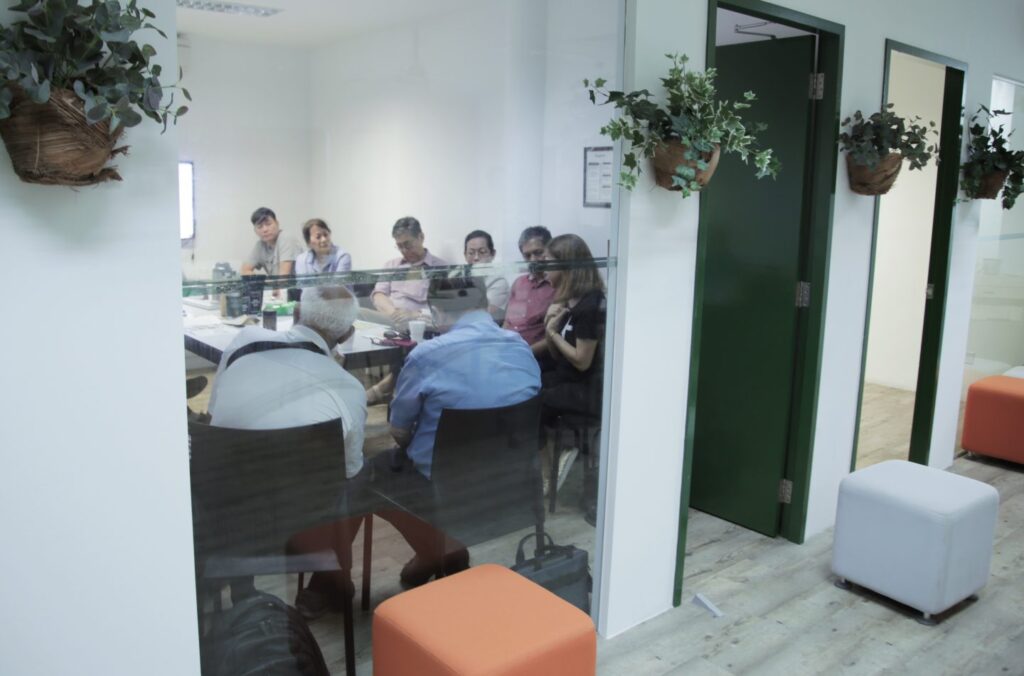
Startups can book conference rooms for meetings and trainings. Staying true to the forest theme, each room is named after a tree.
And it’s not just tech startups he’s interested in but he’s also looking out for those in music, art, healthcare and language, so that “by all means some can be saved” (1 Cor 19:22).
Currently the startups based at the hub are working on a myriad of projects such as providing cheap mobile data in the Middle East, running online platforms to teach English and bringing solar power to Central Asia.
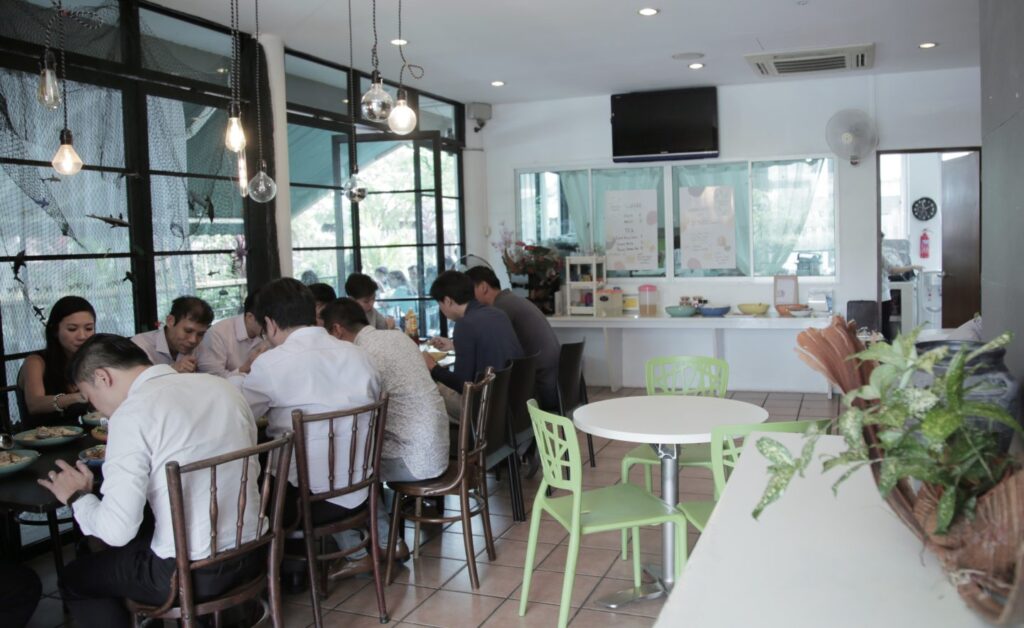
The café, which is not opened to the public, is being run by an entrepreneur who has a passion for baking. Instead of prices on the menu, there are suggested donation amounts.
The hope is that as the various startups rub shoulders at the hub, they will be able to learn from one another and even collaborate on new ideas for greater reach.
Lim sees the hub as more than just a physical space. “To make an impact, it has to be a community,” he adds.
“To make an impact, it has to be a community.”
A digital evangelist, he is planning networking sessions for “missional dreamers”, TED-style talks that are both inspirational and practical as well as mentoring for the startups.
The hub has also been a God-sent for startups which cannot afford to pay for a permanent home.
Indigitous Singapore, which aims to advance God’s kingdom in the digital space, has been flitting between places in the last four years. Entirely led by volunteers, it hasn’t been easy for them to find spaces to meet up and hold community events. It now calls the hub, home.
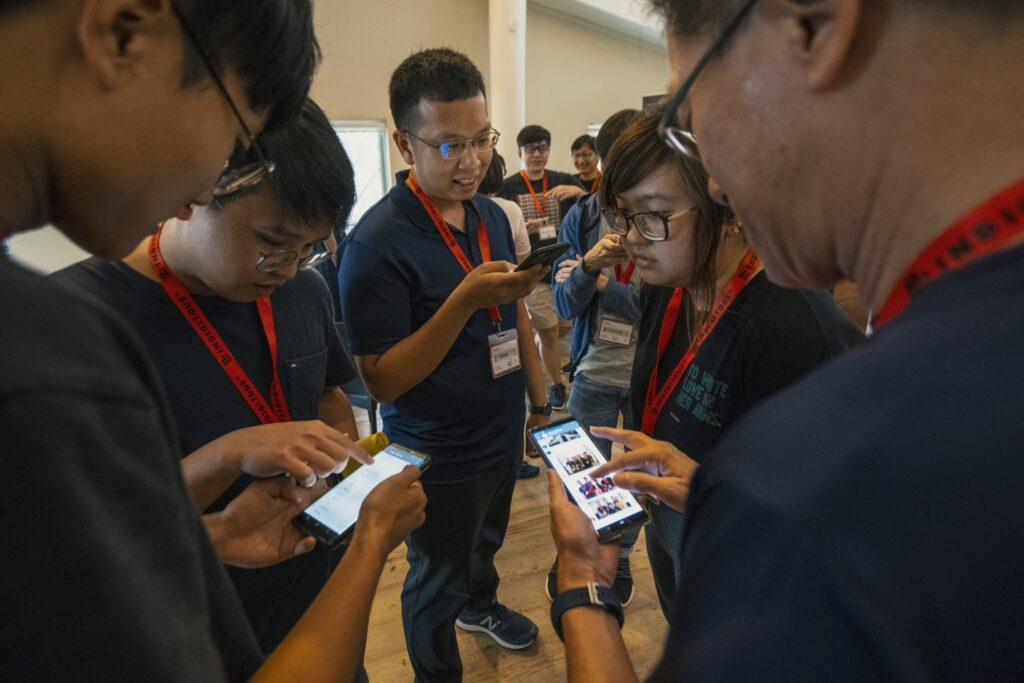
Indigitous Singapore recently ran a hackathon at the hub where teams worked on solving mission problems with digital solutions. Photo courtesy of Indigitous Singapore.
“We’re really encouraged and excited that we’re no longer nomadic and that we now have a fixed place,” said Xael Tan, 35, the city co-leader for the organisation. “We recently ran a hackathon at the hub and the space was just nice.
“And it’s good to have a common place to meet between us and the community. A lot of our work is digital but meeting physically still matters for relationship.”
Solving real problems
Although the hub is not focused on creating commercial startups, Lim is hoping that the next Uber or Facebook would emerge from the space.
“We may not have the resources of Google but we can use the same technology like the internet, Wi-Fi or 4G. We want these startups to dream big and, who knows, the next Grab might come from here,” he muses.
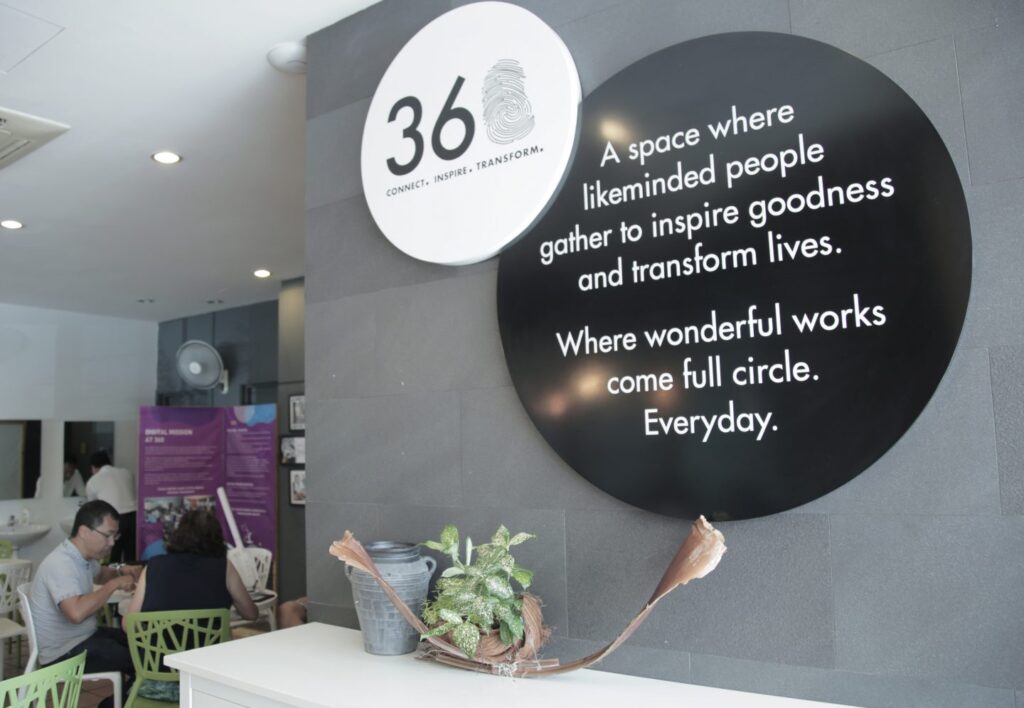
Shu Chen is planning to build up the community at the hub with networking sessions, TED-style talks and mentoring for the startups.
“New wealth, or missional wealth, must be created to help fund missions. Imagine if that startup was nurtured and mentored here and, when it becomes successful, the founder is probably more willing to give back to missions because of the relationship that’s been built up.”
“We are committed to journey with these startups.”
Lim is not content with just innovative ideas that “do the same things a bit better”. He’s after disruptive ideas that “make the old things obsolete” and can fast-track the Gospel to the unreached.
“We want to spawn many credible startups for missions, startups that will solve real problems in the mission field and transform missions on the same level that Uber and Facebook did for the world,” he says.
“We don’t have the answers, and a lot of it is experimental, but we are committed to journeying with these startups.”
Digital Mission @ 360
Co-labouring hub for missional people doing digital mission.
360 Dunearn Road, Singapore 299552
